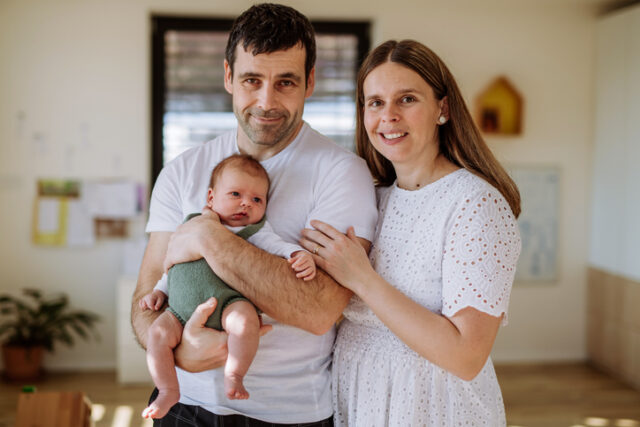Parenting as a team sounds great in theory—until you’re in the thick of it.

One parent says yes, the other says no. One’s strict, the other’s soft. And before you know it, you’re not just trying to raise decent humans; you’re trying to keep your partnership from falling apart in the process.
When you and your spouse aren’t on the same page, everything feels harder. Of course, you don’t have to agree on every single thing to be a strong parenting team. It’s more about understanding, communication, and building a shared foundation. With that in mind, here’s how to sync up with your spouse when it comes to raising your kids.
1. Talk about your values, not just your rules.

It’s easy to get caught up in the logistics—bedtimes, screen time, chores—but the real connection happens when you talk about the why behind those decisions. What kind of people do you want your kids to become? What values matter most to both of you?
Having this deeper conversation helps align your parenting styles. You might still have different methods, but if your core values are in sync, it becomes easier to support each other and present a united front when it counts.
2. Make time for regular check-ins.

Life gets busy, and parenting can feel like a nonstop to-do list. That’s why setting aside time to talk, just the two of you, about how things are going makes such a difference. Even a quick weekly check-in can help keep small frustrations from turning into big conflicts.
Use this time to vent, celebrate wins, and talk through anything that’s felt out of sync lately. When you both feel heard and supported, it becomes easier to stay connected and collaborative.
3. Respect each other’s strengths.
 Source: Unsplash
Source: Unsplash You and your spouse likely have different parenting strengths. Maybe one of you is better at calming tantrums, while the other’s great at homework help. Instead of comparing or competing, acknowledge and appreciate what each of you brings to the table.
When you lean into each other’s strengths rather than pointing out what the other “isn’t doing,” it creates trust and balance. Kids benefit from seeing both parents in their element, and you both feel more confident in your roles.
4. Present a united front, even when you disagree.

Disagreements are going to happen, and that’s totally normal. But when they play out in front of the kids, it can cause confusion and tension. It’s important to back each other up in the moment and save deeper discussions for private conversations.
This doesn’t mean you’re pretending to agree; it just means you’re prioritising stability and consistency for your kids. Later, when it’s just the two of you, you can work through your differences and come up with a plan together.
5. Don’t keep score or assign blame.

Parenting isn’t 50/50 every single day. Some days, one of you might be stretched thinner than the other. It’s easy to fall into the trap of tallying up who’s doing more or who made the last mistake, but that mindset only creates resentment.
Instead, focus on supporting each other through the ups and downs. If something feels uneven, talk about it, but from a place of wanting to fix it together, not point fingers. The goal isn’t to be even all the time; it’s to feel like a team.
6. Be open about what’s hard for you.

Nobody has it all figured out, even if they look like they do. If something’s been weighing on you—like feeling disconnected from the kids, overwhelmed with tasks, or unsure about your role—talk about it.
Being vulnerable opens the door for better understanding. When you let your partner in on what you’re struggling with, they’re more likely to meet you with compassion instead of frustration. It brings you closer and reminds you that you’re in this together.
7. Avoid undermining each other in front of the kids.

It might be tempting to swoop in and “fix” a moment when your spouse is handling something differently than you would. But doing that in front of the kids can send the message that they don’t have to take both parents seriously.
If something genuinely feels off, make a mental note and bring it up later. Respecting each other’s parenting decisions, even when they’re not perfect, helps build a stronger front and avoids unnecessary power struggles.
8. Make decisions together, especially the big ones.

From choosing schools to handling discipline, major decisions should be a joint effort. When one parent makes all the calls, the other can start to feel shut out or dismissed. Even if one of you takes the lead in certain areas, checking in before big decisions shows respect and strengthens your bond. It also ensures you’re both on the same page when those decisions come up in daily life.
9. Give each other room to parent in your own way.

You don’t have to parent exactly the same to be in sync. Sometimes, trying to get your spouse to do everything your way can backfire and create more tension than it solves. It’s okay to have slightly different approaches, as long as you’re aligned on the core values. Letting your partner be themselves allows the kids to experience different styles of love and support—and helps each parent feel respected in their role.
10. Be honest about burnout.

Parenting is exhausting, and pretending otherwise helps no one. If one of you is running on empty, it’s important to say so instead of bottling it up until it turns into frustration or withdrawal. When you’re honest about burnout, it gives your partner a chance to step in and offer support. Taking turns, asking for breaks, or even just being more gentle with each other can go a long way in keeping things balanced.
11. Celebrate each other’s wins.

It’s easy to focus on what’s not getting done, but recognising the good stuff matters too. Whether it’s a smooth bedtime, a creative lunchbox, or just staying calm during a meltdown, give each other credit. Positive reinforcement isn’t just for kids; it helps adults feel seen and appreciated. The more you lift each other up, the more encouraged you both feel to keep showing up as your best parenting selves.
12. Set boundaries with outside influences.

Family, friends, books, and social media all have plenty of opinions about how you *should* be parenting. If one of you feels pressure to parent a certain way because of outside expectations, it can cause tension and misalignment. Talk openly about the voices influencing you both. Decide together what advice you’ll take on and what you’ll leave behind. Protecting your shared parenting space helps create a more unified and grounded approach.
13. Create rituals that keep you connected as partners, not just co-parents.

When life revolves around the kids, it’s easy to forget the “couple” part of the equation. But staying connected as partners makes parenting together so much easier and more fulfilling. Whether it’s a regular date night, a quick coffee together before the day starts, or even just chatting in bed after the kids are asleep, these small rituals help you reconnect. When your relationship is solid, your parenting dynamic gets stronger too.
14. Remember you’re both still learning.

No one has all the answers. You’re both figuring it out in real-time, learning from mistakes, and growing right alongside your kids. Giving each other that grace can make all the difference.
When you approach parenting as teammates, not competitors, it creates space for mutual support. You’ll still disagree sometimes, but you’ll also be better equipped to work through it without drifting apart. And that’s what strong co-parenting is all about.




